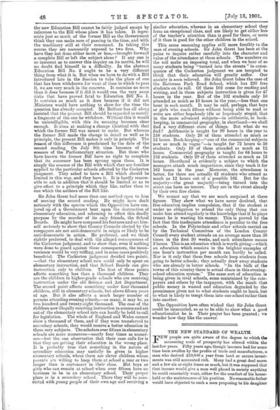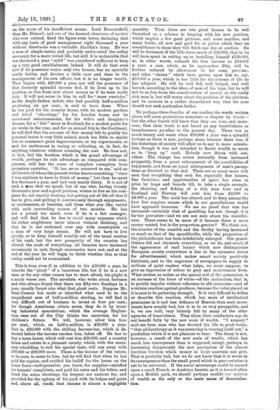THE NEW STANDARD OF "WEALTH.
FEW people are quite aware of the degree to which the measuring scale of prosperity has altered within the lastfew years. Fifty years ago, though incomes had for some time been swollen by the profits of trade and manufactures, a man who derived 210,000 a year from land or secure invest- ments was still accounted rich. Many had a greqt deal more. and a few six or eight times as much, but it was supposed that that income would give a man well placed in society anything he could reasonably want, either for the comfort of his house- hold or the maintenance of his position. No reasonable father would have objected to such a man proposing to his daughter
on the score of his insufficient means. Lord Beaconsfield, then Mr. Disraeli, and one of the keenest observers of society who ever existed, fixed the figure even lower, declaring that with any basis of good management eight thousand a year without drawbacks was a veritable Aladdin's lamp. He was a man of simple tastes, and probably under-rated the outlay necessary for a more varied life, but still it is undeniable that ten thousand a year "solid" was considered sufficient to keep up a very gOod establishment indeed. It will do that even now if ith possessor wants only two houses, has no specially costly habits, and devotes a little care and time to the management of his own affairs, but it is no longer wealth. That begins with 220,000 a year, nor will the possessor of that formerly splendid income feel, if he lives up to his position, as free from care about money as if he were really rich. It will not occur to him to call for" more curricles," as the Anglo-Indian nabob, who had possibly half-a-million producing six per cent., is said to have done. When he has paid for his country house, with its modern gardens and hired "shootings," for his London house and its occasional entertaanments, for his wife's and daughter's dresses, for a " fair " moor in Scotland, for a modest yacht for six weeks in the year, and for an annual trip to the Continent, he will find that the amount of free money left to gratify his personal tastes is very little indeed, much too little to enable him to commence great improvements, or try experiments, or seek for excitement in racing or collecting, or, in fact, do anything whatever without counting the cost. He does not, in fact, feel the freedom which is the grand advantage of wealth, perhaps its sole advantage as compared with com- petence, still less the sense of complete exemption from pecuniary anxieties. "It has never occurred to me," said an old brewer of whom the present writer knows something, "since I was eighteen to have to think of money," but then he spent five thousand a year, and had very nearly thirty. It is not of such a Ran that we speak, but of one who, haring twenty thousand a year and a good position, wishes to live as his com- peers do, not exactly wasting, but getting out of life all that it has to give, and getting it continuously through enjoyments, or excitements, or luxuries, call them what you like, varied with each succeeding season of two months. He has not a pound too much, even if he is a fair manager, and will find that he has to avoid many expenses which his richer neighbours incur almost without thinking, and that he is not reckoned over any wide countryside as a man of very large means. He will not have to live quietly, or to keep himself notably out of the usual routine of his rank, but the new prosperity of the country has altered the scale of everything, all luxuries have increased enormously in cost, though necessaries have not, and at the end of the year he will begin to think whether this or that outlay could not be economised.
This is true, even if, in addition to his 220,000 a year, he inherits the "plant" of a luxurious life, but if he is a new man, or for any other reason has to start afresh, his plight is a much worse one. The novelists who write about fortunes and who always forget that there are fifty-two Sundays in a year, usually forget also what that plant costs. Suppose Mr. Semi-Cronus has made or inherited what used to be the magnificent sum of half-a-million sterling, he will find it very difficult out of business to invest at four per cent., for though Americans obtain seven, they do it by trust- ing industrial speculations, which the average English- man once out of the City thinks too uncertain for his children's future. We will, however, allow him four Per cent, which, on half-a-million, is 219,000 a year, that is, 020,000 with the shilling Income-tax, which is de- ducted before the income reaches him, taken off. He has to buy a town house, which will cost him 220,000, and a country house and estate in a pleasant county, which, with the neces- sary rebuilding to suit his special taste, will run away with E80,000 or 290,000 more. There is the income of the estate, to be sure, to come to him, but he will find that when he has paid for repairs, and scolded his bailiff for the losses on the home farm—indispensable, you know, for supplies—satisfied his tenants' complaints, and paid his rates and his tithes, and hired the extra shootings his keepers are anxious for, and provided for the upkeep of his park with its lodges and gates and, above all, roads, that income is almost a negligible
quantity. Then there are two great houses to be well furnished on a scheme in keeping with his new position, which implies a few good pictures, and some marbles, and many books, all new and paid for at prices which bear no resemblance to those they will fetch one day at auction. He will be fortunate if the bills leave much of 220,000, that is, he will have spent in setting up or installing himself £130,000, or, in other words, reduced his free income to £14,000 a year, a sum which, as he approaches fifty, will be further reduced by allowances to his sons, penecni, and other " claims " which have grown upon him to, say, 210,000 a year, which is too little for the scheme of life he has adopted. He will be well fed, well lodged, and well horsed, according to the ideas of men of his type, but he will not be as free from the consideration of money as the really rich man is, but will worry about the position of his children, and be anxious in a rather shamefaced way that his sons should not seek portionless brides.
To perhaps three-fourths of our readers the words written above will seem pretentious nonsense—a chapter by Ouida- but the other fourth will know that they are true, and, more- over, that their truth is not based on any wastefulness or luxuriousness peculiar to the present day. There was as much luxury and waste when £10,000 a year was a splendid fortune as there is now, perhaps more, because there was, if the historians of society will allow us to say it, more ostenta- tion, though it was not intended to flaunt wealth so much as to "keep up" rank. Nobody now drives with out- riders. The change has arisen naturally from increased prosperity, from a great enlargement of the possibilities of enjoyment, and from an equal enlargement of men's percep- tions as directed to that end. There are so many more rich men that everything they seek for, especially fine houses, fine furniture, and opportunities of sport, has risen in price by leaps and bounds till, to take a single example, the shooting and fishing of a rich man here and in Scotland and Norway will cost him from 22,000 to 24.000 a year. The scale has altered, and to keep among the first few requires means which to our grandfathers would have appeared immense. Are see no proof that vice has increased—certainly that of gambling has not, though it is far too prevalent—and we are not sure about the wasteful- ness. There seems to be more of it because there is more money wasted, but is the proportion greater? We think not, the number of the sensible and the thrifty having increased as much as that of the spendthrifts, while the proportion of the philanthropic has been indefinitely enlarged. Our grand- fathers did not chronicle everything as we do, and much of the appearance of mad luxury which now distinguishes European society everywhere is due to the excessive desire for advertisement, which makes smart society positively histrionic, and to the eagerness of newspapers to supply to millions of quiet readers what helps, we must suppose, to give an impression of colour to grey and monotonous lives. What strikes us rather as the special evil of the generation is an increase of the force of whim—of the inclination, that is, to gratify impulse without reference to old restraints—and of a certain reaction against goodness, because the value placed on it is seen to be gathering strength. It is very difficult to define or describe this reaction, which has more of intellectual pessimism in it and leas defiance of Heaven than such move- ments have usually had, but it is to us very perceptible, and is, we are told, very bitterly felt by many of the older agencies of benevolence. They alone, their conductors say, do not benefit fully by the new scale of wealth. "I suspect," said one keen man who has devoted his life to good works, "that philanthropy as it was yesterday is wearing itself out," a prediction which it is not pleasant to hear. The decay is not, however, a result of the new scale of wealth, which has much less consequence than is supposed, except, perhaps, in increasing dangerously the new perception of the almost limitless freedom which money in large amounts can give. That is probably bad, but we do not know that it is worse in its consequences than the small greed which in poor societies is apt to be universal. If the social microscope could be turned upon a small French or Austrian hamlet, as it is turned often upon a British park, we should perhaps modify our opinion of wealth as the only or the main cause of demoralisa- tion.







































 Previous page
Previous page